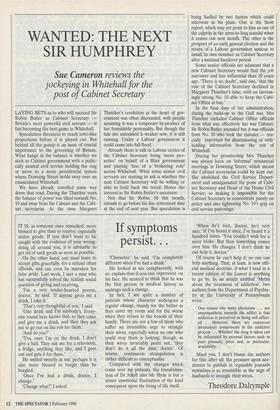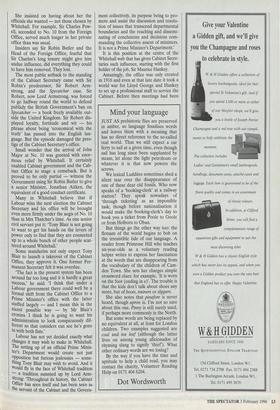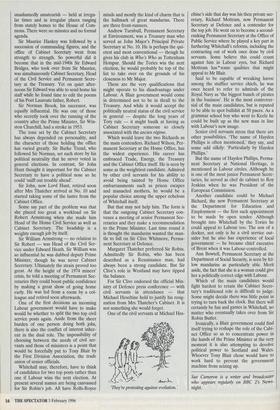WANTED: THE NEXT SIR HUMPHREY
Sue Cameron reviews the jockeying in Whitehall for the post of Cabinet Secretary
LAYING BETS as to who will succeed Sir Robin Butler as Cabinet Secretary Britain's most powerful civil servant — is fast becoming the best game in Whitehall.
Speculation threatens to reach lotto-like proportions before it is played out. But behind all the gossip is an issue of crucial importance to the governing of Britain. What hangs in the balance is whether we stick to Cabinet government with a politi- cally neutral civil service holding the ring or move to a more presidential system where Downing Street holds sway over an emasculated Whitehall.
We have already travelled some way down that road. During the Thatcher years the balance of power was tilted towards No. 10 and away from the Cabinet and the Cabi- net secretariat. At the time Margaret Thatcher's revolution at the heart of gov- ernment was often discounted, with people assuming it was a temporary by-product of her formidable personality. But though the tide she unleashed is weaker now, it is still running. Under a Labour government it could come into full flood.
Already there is talk in Labour circles of the Cabinet Secretary being 'more pro- active' on behalf of a Blair government and playing 'less of a brokering role' across Whitehall. What some senior civil servants are starting to ask is whether the next Cabinet Secretary will be willing or able to hold back the trend. Hence the interest in Sir Robin Butler's successor.
Not that Sir Robin, 58 this month, intends to go before his due retirement date at the end of next year. But speculation is being fuelled by two factors which could intervene in his plans. One is the Scott report, which may yet point to him as one of the culprits in the arms-to-Iraq scandal when it comes out next month. The other is the prospect of an early general election and the return of a Labour government anxious to install its own nominee as Cabinet Secretary after a minimal handover period.
Some senior officials are adamant that a new Cabinet Secretary would find the job narrower and less influential than 20 years ago. 'There is no doubt', said one, 'that the role of the Cabinet Secretary declined in Margaret Thatcher's time, with an increas- ingly strong No. 10 able to keep the Cabi- net Office at bay.'
In the final days of her administration, during the build-up to the Gulf war, Mrs Thatcher excluded Cabinet Office officials from what was effectively her war Cabinet. Sir Robin Butler attended but it was officials from No. 10 who took the minutes — cru- cially important for disseminating or with- holding information from the rest of Whitehall.
During her premiership Mrs Thatcher was always keen on 'informal' ministerial meetings in Downing Street, which meant the Cabinet secretariat could be kept out. She abolished the Civil Service Depart- ment and amalgamated the posts of Cabi- net Secretary and Head of the Home Civil Service, so making it impossible for the Cabinet Secretary to concentrate purely on policy and also tightening No. 10's grip on civil service patronage. She insisted on having about her the officials she wanted — not those chosen by Whitehall. For example, Sir Charles Pow- ell, seconded to No. 10 from the Foreign Office, served much longer in her private office than was usual.
Insiders say Sir Robin Butler and the Head of the Foreign Office, fearful that Sir Charles's long tenure might give him undue influence, did everything they could to have him removed. They lost.
The most public setback to the standing of the Cabinet Secretary came with Sir Robin's predecessor, Sir Robert Arm- strong, and the Spycatcher case. Sir Robert, now Lord Armstrong, was forced to go halfway round the world to defend publicly the British Government's ban on Spycatcher — a book freely available out- side the United Kingdom. Sir Robert dis- played loyalty, fortitude and wit — his phrase about being 'economical with the truth' has passed into the English lan- guage. But the episode damaged the pres- tige of the Cabinet Secretary's office.
Small wonder that the arrival of John Major at No. 10 was greeted with enor- mous relief by Whitehall. It certainly enabled Cabinet government and the Cab- inet Office to stage a comeback. But it proved to be only partial — witness the Government using Sir Robin Butler to give a senior Minister, Jonathan Aitken, the equivalent of a good conduct certificate.
Many in Whitehall believe that if Labour wins the next election the Cabinet Secretary and his office will be brought even more firmly under the aegis of No. 10 than in Mrs Thatcher's time. As one senior civil servant put it: 'Tony Blair is not going to want to get his hands on the levers of Power only to find that they are connected up to a whole bunch of other people scat- tered around Whitehall.'
Some mandarins not only expect Tony Blair to launch a takeover of the Cabinet Office, they approve it. One former Per- manent Secretary felt it was overdue.
`The fact is the present system has been around far too long and it is hardly a great success,' he said. 'I think that under a Labour government there could well be a formal shift from the Cabinet Office to a Prime Minister's office with the latter staffed largely — and I mean this in the nicest possible way — by Mr Blair's cronies. I think he is going to want his administration to look conspicuously dif- ferent so that outsiders can see he's gone in with both fists.'
Labour has not yet decided exactly what changes it may wish to make in Whitehall. The setting up of an official Prime Minis- ter's Department would create not just opposition but furious jealousies — some- thing Tony Blair may wish to avoid. And it would fly in the face of Whitehall tradition — a tradition summed up by Lord Arm- strong: 'Throughout its history, the Cabinet Office has seen itself and has been seen as the servant of the Cabinet and the Govern-
ment collectively, its purpose being to pro- mote and assist the discussion and resolu- tion of issues that transcend departmental boundaries and the reaching and dissemi- nating of conclusions and decisions com- manding the collective assent of ministers. It is not a Prime Minister's Department.'
It is this position at the centre of the Whitehall web that has given Cabinet Secre- taries such influence, starting with the first holder of the job, Sir Maurice Hankey.
Amazingly, the office was only created in 1916 and even at that late date it took a world war for Lloyd George and Hankey to set up a professional staff to service the Cabinet. Before then meetings had been unashamedly amateurish — held at irregu- lar times and in irregular places ranging from stately homes to the House of Com- mons. There were no minutes and no formal agenda.
Sir Maurice Hankey was followed by a succession of commanding figures, and the office of Cabinet Secretary went from strength to strength. So powerful did it become that in the mid-1940s Sir Edward Bridges, who took over from Sir Maurice, was simultaneously Cabinet Secretary, Head of the Civil Service and Permanent Secre- tary at the Treasury. Yet on quiet after- noons Sir Edward was able to send home his staff while he found time to edit the poems of his Poet Laureate father, Robert.
Sir Norman Brook, his successor, was equally influential. He was one of those who secretly took over the running of the country after the Prime Minister, Sir Win- ston Churchill, had a stroke in 1953.
The tone set by the Cabinet Secretary has always depended on personality, and the character of those holding the office has varied greatly. Sir Burke Trend, who followed Sir Norman, set such store by his political neutrality that he never voted in general elections. In contrast, Sir John Hunt thought it important for the Cabinet Secretary to have a political nose so he could 'sniff out trouble ahead'.
Sir John, now Lord Hunt, retired soon after Mrs Thatcher arrived at No. 10 and started taking some of the lustre from the Cabinet Office.
Some say part of the problem was that she placed too great a workload on Sir Robert Armstrong when she made him Head of the Home Civil Service as well as Cabinet Secretary. The headship is a weighty enough job by itself.
Sir William Armstrong — no relation to Sir Robert — was Head of the Civil Ser- vice under Edward Heath. Sir William was so influential he was dubbed deputy Prime Minister, though he was never Cabinet Secretary. Ultimately the strain proved too great. At the height of the 1974 miners' crisis, he told a meeting of Permanent Sec- retaries they could boost public confidence by making a great show of going home early. He was led from a room by a col- league and retired soon afterwards.
One of the first decisions an incoming Labour government would have to make would be whether to split the two top civil service posts again. Aside from the sheer burden of one person doing both jobs, there is also the conflict of interest inher- ent in the dual role. The impossibility of choosing between the needs of civil ser- vants and those of ministers is a point that would be forcefully put to Tony Blair by the First Division Association, the trade union of senior officials.
Whitehall may, therefore, have to think of candidates for two top posts rather than one if Labour wins the next election. At present several names are being canvassed for Sir Robin's job. All have Rolls-Royce minds and mostly the kind of charm that is the hallmark of great mandarins. There are three front-runners.
Andrew Turnbull, Permanent Secretary at Environment, was a Treasury man who served as John Major's Principal Private Secretary at No. 10. He is perhaps the qui- etest and most conventional — though he gives his club in Who's Who as Tottenham Hotspur. Should the Tories win the next election, he would probably be top of the list to take over on the grounds of his closeness to Mr Major.
These are the very qualifications that might operate to his disadvantage under Labour. A Blair government would come in determined not to be in thrall to the Treasury. And while it would accept the politically neutral status of the civil service in general — despite the long years of Tory rule — it might baulk at having as Cabinet Secretary someone so closely associated with the ancien regime.
Which would leave the two Richards as the main contenders. Richard Wilson, Per- manent Secretary at the Home Office, has the widest experience. His career has embraced Trade, Energy, the Treasury and the Cabinet Office itself. He is seen by some as the weightiest candidate. Admired by other civil servants for his ability to avoid being tainted by Home Office embarrassments such as prison escapes and manacled mothers, he would be a popular choice among the upper echelons of Whitehall itself.
But that may not help him. The form is that the outgoing Cabinet Secretary con- venes a meeting of senior Permanent Sec- retaries and they make a recommendation to the Prime Minister. Last time round it is thought the mandarins wanted the man- tle to fall on Sir Clive Whitmore, Perma- nent Secretary at Defence.
Margaret Thatcher preferred Sir Robin. Admittedly Sir Robin, who has been described as a Renaissance man, had always been a strong candidate. But Sir Clive's role in Westland may have tipped the balance.
For Sir Clive endorsed the official Min- istry of Defence press conference — with civil servants in attendance — that Michael Heseltine held to justify his resig- nation from Mrs Thatcher's Cabinet. It is not something she would forget.
One of the civil servants at Michael Hes-
'They're protesting against evolution.'
eltine's side that day was his then private sec- retary, Richard Mottram, now Permanent Secretary at Defence and a contender for the top job. He went on to become a second- ranking Permanent Secretary at the Office of Public Service where he played a key part in furthering Whitehall's reforms, including the contracting out of work once done by civil servants. Some believe this could count against him in Labour eyes, but Richard Mottram has `some qualities that might appeal to Mr Blair.
Said to be capable of wreaking havoc among the stuffier service chiefs, he was once heard to refer to admirals of the Royal Navy as 'the biggest bunch of pirates in the business'. He is the most controver- sial of the main candidates, but is reputed to be able to spot bullshit at 50 paces. As a grammar school boy who went to Keele he could be built up as the new man in line with Labour's new image.
Senior civil servants stress that there are other possibilities. 'The name of Hayden Phillips is often mentioned,' they say, and some add silkily: 'Particularly by Hayden Phillips.'
But the name of Hayden Phillips, Perma- nent Secretary at National Heritage, is mentioned in Labour circles. Although he is one of the most junior Permanent Secre- taries, he served as chef de cabinet to Roy Jenkins when he was President of the European Commission.
Another candidate could be Michael Bichard, the new Permanent Secretary at the Department for Education and Employment — the first such appointment to be made by open tender. Although brought into Whitehall by the Tories he could appeal to Labour too. The son of a docker, not only is he a civil service out- sider but he also has experience of local government — he became chief executive of Brent when it was Labour-controlled.
Ann Bowtell, Permanent Secretary at the Department of Social Security, is seen by fel- low mandarins as particularly able. Merit aside, the fact that she is a woman could give her a politically correct edge with Labour.
Which of the main candidates would fight hardest to retain the Cabinet Secre- tary's traditional role is difficult to judge. Some might decide there was little point in trying to turn back the clock. But there will certainly be fun and games in Whitehall, no matter who eventually takes over from Sir Robin Butler.
Ironically, a Blair government could find itself trying to reshape the role of the Cabi- net Office so as to concentrate power in the hands of the Prime Minister at the very moment it is also attempting to devolve political power to Scotland and Wales. Whoever Tony Blair chose would have to work hard to prevent the government machine from seizing up.
Sue Cameron is a writer and broadcaster who appears regularly on BBC 2's News- night.




































































 Previous page
Previous page